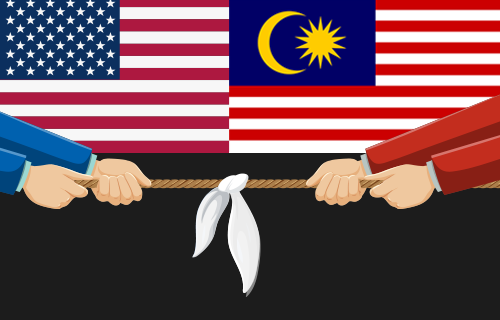IDEAS argues ratification of CPTPP would provide low-hanging fruit for economy battered by COVID-19

Kuala Lumpur, 13 December 2021 – The Institute for Democracy and Economic Affairs (IDEAS) recently held a webinar entitled ‘How can Malaysian Industries Possibly Benefit from CPTPP?’ The webinar concerned how Malaysian industries will benefit from the ratification of the Comprehensive and Progressive Trans-Pacific Partnership (CPTPP), and was moderated by Dr. Zokhri Idris, External Relations Director at IDEAS. Opening remarks were provided by Tricia Yeoh, CEO of IDEAS, while other panellists included Amir Bukhairi Bakhtiar and Nik Mohd Salihin Nik Mustapha of Strategic Negotiations Division at the Ministry of International Trade and Industry (MITI), Dr. Juita Mohamad, Indo Pacific Fellow Perth at the US Asia Centre, and Dr. Shankaran Nambiar, Senior Research Fellow from the Malaysian Institute of Economic Research (MIER).
Tricia opened the webinar by citing research by IDEAS which suggested that ratifying the CPTPP would boost Malaysia’s GDP by over MYR 14 billion, or a 1% increase. This, she argues, would provide a valuable low-hanging fruit for an economy battered by the pandemic. She also points to other benefits such as better regulatory standards in Malaysia in areas including labor and public procurement. She also states that the risks associated with ratifying the agreement must also be discussed openly, such as whether non-exporting SMEs will benefit. She argues that by approaching the debate with ‘our eyes open’ on both the benefits and risks associated with the CPTPP will allow us to approach it with more intellectual honesty. She stresses ultimately that the benefits to be accrued from ratifying the agreement will outweigh the costs.
Tricia also added that other economies have formally applied to join the CPTPP, including the UK, China, and Taiwan. She noted that Taiwan’s potential entry into the CPTPP would further increase Malaysia’s GDP by over MYR 2 billion, and create 20,000 additional jobs. She observes that an expansion of the CPTPP would further benefit Malaysia through an increase of market access for Malaysian industries.
The first presentation was provided by Amri Bukhairi, who provided a brief overview and background of the CPTPP. He pointed out that as of now, only three signatories to the CPTPP are pending ratification, including Malaysia, Chile, and Brunei Darussalam. Without ratification, these countries are unable to enjoy the preferential tariff rates offered under the agreement, and are also unable to block any consensus made by the other parties in all CPTPP meetings. Boikhari stated that amendments to Malaysia’s laws in order to meet the obligations of the agreement are progressing well, with six out of the identified 14 Acts having already been amended accordingly. He also said that stakeholder consultations, including with state governments, are ongoing and have been garnering positive feedback.
Amri Bukhairi expressed the confidence of MITI that Malaysia is on track to ratify the CPTPP by the third quarter of 2022. Referencing the possible accessions of the UK, China, and Taiwan into the CPTPP, Amri Bukhairi pointed out that as a signatory rather than fully-fledged party to the agreement, Malaysia is unable to participate in all accession-related meetings. As such, he argues that ratification is not only about enjoying the economic benefits of the agreement, but also about being actively involved in future accession-related negotiations.
Nik Salihin followed by discussing how Malaysian industries can benefit from the CPTPP. He points out that the CPTPP includes comprehensive tariff elimination across all sectors, with very limited exceptions (in the case of Malaysia this includes live poultry, meat, and eggs). Countries will be provided a grace period when it comes to duty eliminations, which in the case of Malaysia is up to 16 years. Among the tariff commitments Malaysia will have to undertake upon ratification include the elimination of tariffs on iron and steel and medical devices. He also points out that the CPTPP will provide greater market access opportunities, including for economies in which Malaysia currently lacks a free trade agreement with, such as Canada, Peru, and Mexico. Besides tariffs, the CPTPP will also address non-tariff barriers (NTBs) through the inclusion of dedicated disciplines aimed at enhancing transparency.
Dr. Juita Mohamad, for her part, argued that it is ultimately in the economic, social, and security interests of Malaysia to ratify the CPTPP. She noted that both the TPP and CPTPP include comprehensive chapters on areas such as labour, the environment, ISDF, and IP, all of which will support trading activities in a more sustainable manner. She argues that this is what distinguishes the CPTPP from more traditional trade agreements which only deal with trade in goods and services as well as investments.
She points out that Malaysian manufacturing will be one of the biggest benefactors of the CPTPP, especially given the industry’s current drive to participate in the Fourth Industrial Revolution (4IR). In terms of welfare gains, Dr. Juita points out that Malaysia was expected to benefit the most from the agreement given ratification took place in a timely manner. She references a past study by the World Bank which argued that smaller and more open economies such as Vietnam and Malaysia would accrue relatively larger benefits from the CPTPP compared to larger ones. She also argues that for Malaysian industries to participate in 4IR confidently, it will need access to newer and cheaper technologies, which is where the CPTPP can play a vital role.
Dr. Shankaran Nambiar, providing the final presentation, noted that we can understand the CPTPP through three main dimensions, including (i) the national agenda and whether the agreement infringes upon it, (ii) how your country will be impacted in the very long term, and (iii) how the agreement will impact national industries. With regards to the first national agenda, Dr. Nambiar points out that the CPTPP will bring forth issues which are being hotly debated, such as its impact on state-owned enterprises, intellectual property, ISDF, and Bumiputera rights. With regards to particularly hot-button issues such as intellectual property, Dr. Nambiar argues that the public would be more reassured if the Ministry of Health conducted their own assessment on whether the CPTPP would impact the cost of Malaysian healthcare.
With regards to the long-term view of the CPTPP, he believes that it is unlikely that the United States will rejoin the trading pact, and that it is currently more interested in the economic framework of the Indo-Pacific. Finally, when it comes to the impact of the CPTPP on national industries, Dr. Nambiar notes that while the CPTPP is often labelled as a ‘gold standard’ trade agreement, this may not necessarily be the case for all parties involved. He notes that from the research available that there is evidence that import growth could outstrip export growth for Malaysia post-CPTPP, which could become a serious issue that needs to be considered. From a micro-perspective, he notes that the exports which are expected to benefit the most from the CPTPP include those which Malaysia already has a comparative advantage in, including electronics, machines and equipment, mineral fuels and oils, and certain foodstuffs. Referencing past studies, he notes that there doesn’t seem to be much opportunities for a substantial increase in exports post-CPTPP.
Ultimately, Dr. Nambiar concludes that we have to approach the CPTPP through these various layers, and that Malaysia does not necessarily have to engage in a free trade agreement in order to undertake the sort of domestic reforms required. Ultimately, he thinks that it might be better for countries to liberalize ‘at their own pace’.
— END —
Download Media Statement PDF File Here
For enquiries, please contact:
Zokhri Idris, Ph.D, Director, External Relations
T: +603 2070 8881/8882 | E: zokhri@ideas.org.my

